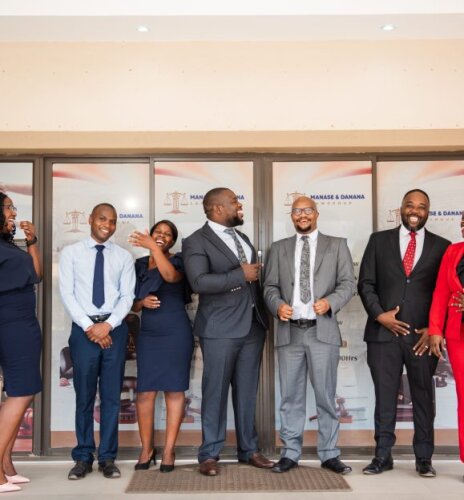Best Accidents & Injuries Lawyers in Harare
Share your needs with us, get contacted by law firms.
Free. Takes 2 min.
List of the best lawyers in Harare, Zimbabwe
About Accidents & Injuries Law in Harare, Zimbabwe
Accidents and injuries law, also known as personal injury law, provides legal remedies for those who have suffered harm due to the negligence or wrongful acts of others. In Harare, Zimbabwe, these laws encompass a range of incidents, including traffic accidents, workplace injuries, medical malpractice, and more. Victims may seek compensation for damages such as medical expenses, lost wages, and pain and suffering. The legal framework in Zimbabwe aims to ensure that responsible parties are held accountable and that victims receive fair compensation.
Why You May Need a Lawyer
There are several situations where engaging a lawyer specializing in accidents and injuries can be crucial:
- Complexity of the Case: Some personal injury cases, such as medical malpractice or wrongful death claims, can be legally complex and require professional expertise to navigate.
- Insurance Company Negotiations: Insurance companies may attempt to minimize their payouts. A lawyer can negotiate on your behalf to ensure you receive a fair settlement.
- Liability Disputes: Determining who is at fault can be contentious. Legal representation is essential if the liable party disputes responsibility.
- Severe Injuries: The more serious your injuries, the more compensation you might deserve. A lawyer can help calculate and argue for full and fair compensation.
- Litigation: If your case goes to court, you will need a lawyer to present evidence and argue your case effectively.
Local Laws Overview
The legal framework in Zimbabwe regarding accidents and injuries includes various statutes and case laws. Key aspects include:
- The Law of Delict: This is the fundamental law governing personal injury claims. It addresses wrongful acts leading to damages and the appropriate remedy.
- Road Traffic Act: This outlines the obligations of road users and penalties for traffic violations. It is vital in cases involving vehicle accidents.
- Occupational Health and Safety Regulations: These regulations protect workers from job-related injuries and illnesses, detailing employer responsibilities and employee rights.
- Medical Services Regulations: Governing the standard of care expected from medical professionals, these regulations are critical in medical malpractice cases.
Frequently Asked Questions
1. What should I do immediately after an accident?
Prioritize your safety and health. Seek medical attention if necessary, report the incident to the authorities, gather evidence, and contact your insurance provider. Consulting with a lawyer can help protect your legal rights early in the process.
2. Can I claim for emotional distress in an injury claim?
Yes, emotional distress can be included in your claim as part of pain and suffering damages. You will need to provide evidence, such as medical records or expert testimony, outlining the psychological impact of your injury.
3. How long do I have to file an injury claim in Harare?
The statute of limitations typically allows a personal injury claim to be filed within three years from the date of the accident. However, it's advisable to consult a lawyer promptly to ensure all deadlines are met.
4. What if the other party is uninsured?
If the liable party is uninsured, you may still have options. Your lawyer can explore potential claims against other liable parties or possibly your insurance company, depending on your policy's terms.
5. How is compensation determined?
Compensation is based on several factors, including the severity of your injuries, medical costs, lost income, and non-economic damages like pain and suffering. Courts or settlements aim to restore you financially to your pre-injury state.
6. Do I need to attend court for my injury claim?
Not necessarily. Many claims are settled through negotiation before reaching trial. However, if a fair settlement cannot be achieved, court proceedings may be necessary.
7. Will I have to pay a lawyer upfront?
Many personal injury lawyers work on a contingency fee basis, meaning they only get paid if you win your case. It's important to discuss fee arrangements during your initial consultation.
8. Can I handle my injury claim without a lawyer?
While it's possible, it is risky. Without legal expertise, you may undervalue your claim or miss critical evidence, reducing your chances of fair compensation.
9. What if I am partially at fault for the accident?
Zimbabwe follows a contributory negligence system. If you are found partially responsible, your compensation may be reduced by the percentage of your fault. Legal advice can be crucial in these scenarios.
10. Are workplace injuries treated differently?
Workplace injuries may fall under a separate legal framework, involving workers' compensation claims. It's essential to report such injuries immediately and consult a lawyer for navigating the claims process.
Additional Resources
Several resources can assist you in understanding and managing accident and injury claims:
- Zimbabwe Law Society: Offers lawyer referral services and legal resources.
- Zimbabwe Republic Police (ZRP): For reporting incidents and obtaining police reports.
- National Social Security Authority (NSSA): Provides information on workplace injuries and related claims.
- Zimbabwe Automotive Association (ZAA): Offers assistance with vehicle accidents and breakdowns.
Next Steps
If you require legal assistance in accidents and injuries, the following steps can guide you:
- Document Everything: Keep comprehensive records of all relevant information and evidence regarding your accident or injury.
- Consult with a Lawyer: Schedule consultations with personal injury lawyers to evaluate your case and receive professional advice.
- File Necessary Reports: Ensure all incidents are reported to authorities and insurance companies as required by law.
- Follow Medical Advice: Adhere to any medical treatment plans, as this can support your claim for damages.
- Engage in Negotiations: Work with your lawyer to negotiate settlements before considering court proceedings.
By following these steps, you can protect your rights and increase your chances of receiving appropriate compensation for your injuries.
Lawzana helps you find the best lawyers and law firms in Harare through a curated and pre-screened list of qualified legal professionals. Our platform offers rankings and detailed profiles of attorneys and law firms, allowing you to compare based on practice areas, including Accidents & Injuries, experience, and client feedback.
Each profile includes a description of the firm's areas of practice, client reviews, team members and partners, year of establishment, spoken languages, office locations, contact information, social media presence, and any published articles or resources. Most firms on our platform speak English and are experienced in both local and international legal matters.
Get a quote from top-rated law firms in Harare, Zimbabwe — quickly, securely, and without unnecessary hassle.
Disclaimer:
The information provided on this page is for general informational purposes only and does not constitute legal advice. While we strive to ensure the accuracy and relevance of the content, legal information may change over time, and interpretations of the law can vary. You should always consult with a qualified legal professional for advice specific to your situation.
We disclaim all liability for actions taken or not taken based on the content of this page. If you believe any information is incorrect or outdated, please contact us, and we will review and update it where appropriate.
Browse accidents & injuries law firms by service in Harare, Zimbabwe
Harare, Zimbabwe Attorneys in related practice areas.












